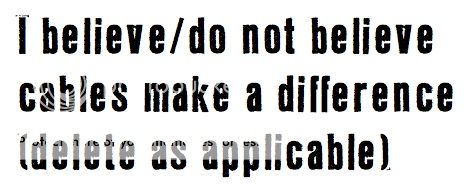MUSICRAFT
Well-known member
Thompsonuxb said:BenLaw said:Thompsonuxb said:Digital interconnects make more difference than anolog by the nature of the digital signal. Its more precise and less splashy at the top end
I don't really know what that means, but can you provide a link in support?
Provide a link, what for......lol.
If you have access to a digital reciever connect your CD player to it directly with digital/optical coax, compare them to Anolog interconnects and agianst each other and then hand on heart report back and tell the truth......provide a link......indeed.
Hi Thompsonuxb
I use a basic (single) interconnect to transfer digital data between a Yamaha BD-S1900 Blu Ray player (coaxial digital out) > Chord Electronics DSP8000 AV processor.
Btw, for optical connection i use a basic fibre optic cable which i bought at the local market for a £1.
All the best
Rick @ Musicraft




